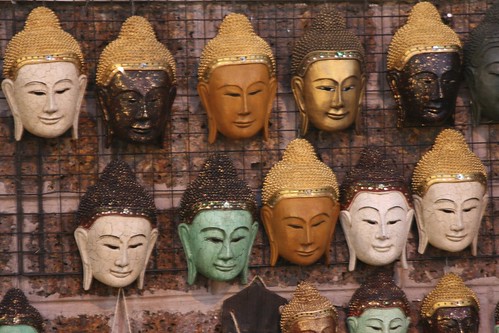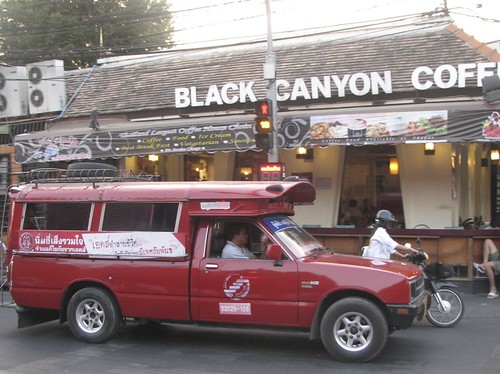Red Truck Lesson
Other than Obama’s inauguration, there hasn’t been a lot of good news so far in 2009.
We’ve had the misfortune of staying in hotels with CNN, and the superficial analysis and relentless doomsaying of cable TV pundits is enough to send the even the most optimistic among us scrambling for the Zoloft.
Obviously, the world faces a daunting economic crisis. Millions of Americans are out of work and facing very difficult times.
But the relentless, mindless coverage that passes for news these days does little to advance our understanding of the problem – or more importantly, the solution.
In Thailand, I’ve asked many people in the tourist industry how business is and every person I’ve spoken to has commented on how slow it is. The tourists, they say, are not coming this year.
Many blame the week long shutdown of Suvarnabhui Airport in November for scaring tourists away. But clearly, there is more to it than that.
Street vendors in Chiang Mai know nothing about bank failures and toxic assets in the United States, but their lives and livelihoods will be affected by them.
As demand plunges in the United States and Europe, the people who make our shoes, electronics and housewares will be thrown out of work in Thailand, Vietnam, China and many other countries. A United Nations agency is predicting that as many as 50 million people will lose their jobs in 2009.
Dennis Blair, the new U.S. Director of National Intelligence, recently told Congress that instability caused by the global economic crisis had become the biggest security threat facing the United States, outpacing terrorism.
All of which had me very depressed one evening as we boarded a songtaew (red truck) to take us to the Tha Phae Gate.
In the weeks we had been in Chiang Mai, we had made this trip many times. The fare has always been the same: 80 baht for the four of us (a little over $2).
When we arrived at our destination, we jumped off the truck and I went to pay the driver. I handed him four 20 baht bills and turned away. In broken English, he called me back.
Here it comes, I thought, the shakedown. He wants more money.
I leaned in the cab. He handed me 20 baht back.
“No pay for him,” he said, pointing to Conor. He smiled and drove away.
I stood on the sidewalk feeling both ashamed and humbled.
Surely this 20 baht (about 60 cents), which I had already given the driver, would have made more of a difference to him than me.
As I stood there, pondering the meaning of it all, I wondered if, in a year’s time, he would have the same spirit of generosity.
More importantly, will I?





3 comments
[…] Read More… […]
Sitting here inside the beltway it is easy to forget how the daily revelations about the state of the economy effect everyone in the world. Knowing that there is a person half way around the world who is not trying to cash in at every opportunity gives me tremendous hope for the future.
Enjoy your Holiday in Cambodia!
You picked a perfect day for this post –lead story in both the WP & NYT report the economy last year and predictions for this year are far worse than expected. Obama eco team’s predictions for just released budget deemed “too rosy.” You don’t want to know the numbers –but even Warren Buffett lost money last year and says the world is “paralyzed by fear.”
The news media does own a large share of that –but that’s just the way it is –journalists were put on this earth to tell us the bad news –they report on the potholes not the smooth ride.
But soon the dismal economy won’t be newsworthy and the inevitable rebound will begin and you’ll see more hope and optimism. Besides the news media is also in it for the $ and they can’t do doing themselves any good.
So in the meantime why not take Monty Python’s advice and “always look on the bright side of life.”
http://www.youtube.com/watch?v=jHPOzQzk9Qo